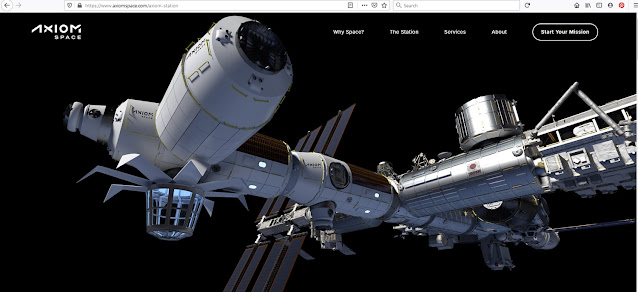Over the course of this blog, I've run a few pieces on a small company with
big dreams. The company is
Axiom Space and
their dream is a privately funded and operated space station. The plans
to get to that goal include
sending private crews to the ISS as part of training, with the launch services provided and vehicles under contract
from SpaceX. That mission, Axiom 1 or AX-1, is currently "penciled in" on the
Spaceflight Now Launch Schedule for February 21, 2022. That's less than
four months from now.
Axiom's vision of their own space station. Older articles talk about them launching a lab that can be docked to the ISS and provide facilities for the private astronauts they want to put up there. The current website implies that "Axiom Hub One" (crew quarters, + research and manufacturing capability) appears to be what they want to launch first to get their own station started.
This week, the competitive field grew with an announcement from Blue Origin about an effort in cooperation with a group of other companies and academic experts to put up a private space station for business and travel, research and tourism, with a goal of starting operation in the second half of this decade.
Blue Origin and Sierra Space today announced plans for Orbital Reef, a commercially developed, owned, and operated space station to be built in low Earth orbit. The station will open the next chapter of human space exploration and development by facilitating the growth of a vibrant ecosystem and business model for the future. Orbital Reef is backed by space industry leaders and teammates including Boeing, Redwire Space, Genesis Engineering Solutions, and Arizona State University.
Designed to open multiple new markets in space, Orbital Reef will provide anyone with the opportunity to establish their own address on orbit. This unique destination will offer research, industrial, international, and commercial customers the cost competitive end-to-end services they need including space transportation and logistics, space habitation, equipment accommodation, and operations including onboard crew. The station will start operating in the second half of this decade.
Sierra Space is an offshoot of Sierra Nevada Corporation, one of the companies
vying for the Human Landing System contract, but not then partnered with Blue
Origin.
Redwire Space is a bit
tough to summarize. Officially,
they're a young company; according to that source, they were formed in June of '20, and they just
went public with a stock Initial Public Offering in September, but their
website shows they've already worked on the recently-launched probe to the
Jovian Lagrange points, Lucy, and
a wide variety of other important satellites
that required that work as much as nearly 30 years ago.
Genesis Engineering Solutions
appears to be a solid player in the satellite contract engineering area.
Boeing is ... unfortunately, at this point in time ... Boeing, the company
that can't get a much simpler
space capsule
than this space station running properly.
Blue Origin's Concept Sketch of the Orbital Reef Space Station.
I have to say when I first heard of this, I thought, "Yeah. Right - the rocket company that can't make orbit is going to build a space station." That was before I looked up the web page for the project and Blue's announcement. Blue Origin and Boeing getting together and agreeing to put up a private space station means the company that can't get a rocket (New Glenn) into orbit and the company that can't get a capsule working right (Starfire) or a different rocket into orbit (SLS) are working together.
Blue and Boeing together saying they're going to do something like this isn't much more of an
indicator of future success than any dozen of us blog readers getting together
and saying that we'll put up a space station. Except for their billions of dollars of funding, fresh from
between the sofa cushions in Jeff Bezos' house.
Is that harsh? Sorry. Space is a harsh place. Boeing used to know how to do this stuff. The justification used to be, "yeah, Boeing will charge more than some others, but their stuff will work." I think it's possible to get that back, but they need to really step up their game.
3997


Yeah, right. Where's the BE4? When will it be ready for flight certification? Last video from the BO factory showed no employees anywhere.
ReplyDeletePersonally, I think they're as dead as Bigelow Aerospace. And Bigelow has flown and orbited flight hardware. In fact, there's an inflatable test module on the ISS now.
What this sounds like is everyone else not SpaceX is panicking at SpaceX's success and falling for the fallacy of 'the enemy of my enemy is my friend.'
Oh, well, can't wait to see what the rulings by the FAA do to SpaceX.
Pussies.
ReplyDeleteFirst company that builds a circular rotating hub, like 2001, gets my investment $$.
Not before.
Starliner vs. Starfire?
ReplyDeleteAs a 30-year Boeing veteran, I disagree that the company can "get it back". I retired in 2013 and they were already well and truly speeding down the tubes. The reasons they are history are legion, and too numerous to list here, but one example serves to illustrate:
ReplyDeleteA coworker noticed that although he was a "valuable employee" who received substantial salary increases each year, the company neither noticed nor cared whether he actually did anything. He tested this hypothesis by not showing up for work a day a week. No-one noticed. He continued to push the envelope until he literally only came in to work one day per month.
No difference. Disgusted, he went ahead and officially retired. When your worth to an organization is so obviously illusory, your morale goes completely down the toilet. Intelligent, motivated people want to work and make a perceptible difference.
This is not an anecdotal story of one disgruntled employee, this is widepsread. Boeing is a dogpile of viciously competing political managers fighting for top spot, with not a care in the world for any "vision" or "mission". They are eating the corpse of a once-great company that will not be coming back.
That's too bad. I retired at the end of '15 from a supplier to Boeing, primarily the commercial aviation side not the rocket or defense sides.
DeleteThat was around the time 787 was starting to fly, which was one of the last major programs I worked on. We would get occasional oddities from them, but those were always resolved when someone from our side called their old contact on your side.
The peak of my career was the 787 development program. Engineers and techs would huddle to fix problems, but never ever get management involved.
DeleteSuch an unfortunate name "Orbital Reef"; on which space ships and dreams are crushed.
ReplyDeleteI'm with you, but I think that Bezos would do better partnering with LEGO than Boeing. Boeing is broken, top to bottom. Hell, if Bezos would swallow his pride and partner with Musk, they'd be on Mars in five years (or whenever the next orbital match which I was too lazy to Google) showed up.
ReplyDeleteBezos and Boeing together....a guy whose company can't get a rocket into orbit (and whose current rocket is the source of phallic memes everywhere), and a company who can't get their capsule right for the NASA rocket. I see great things.
ReplyDelete